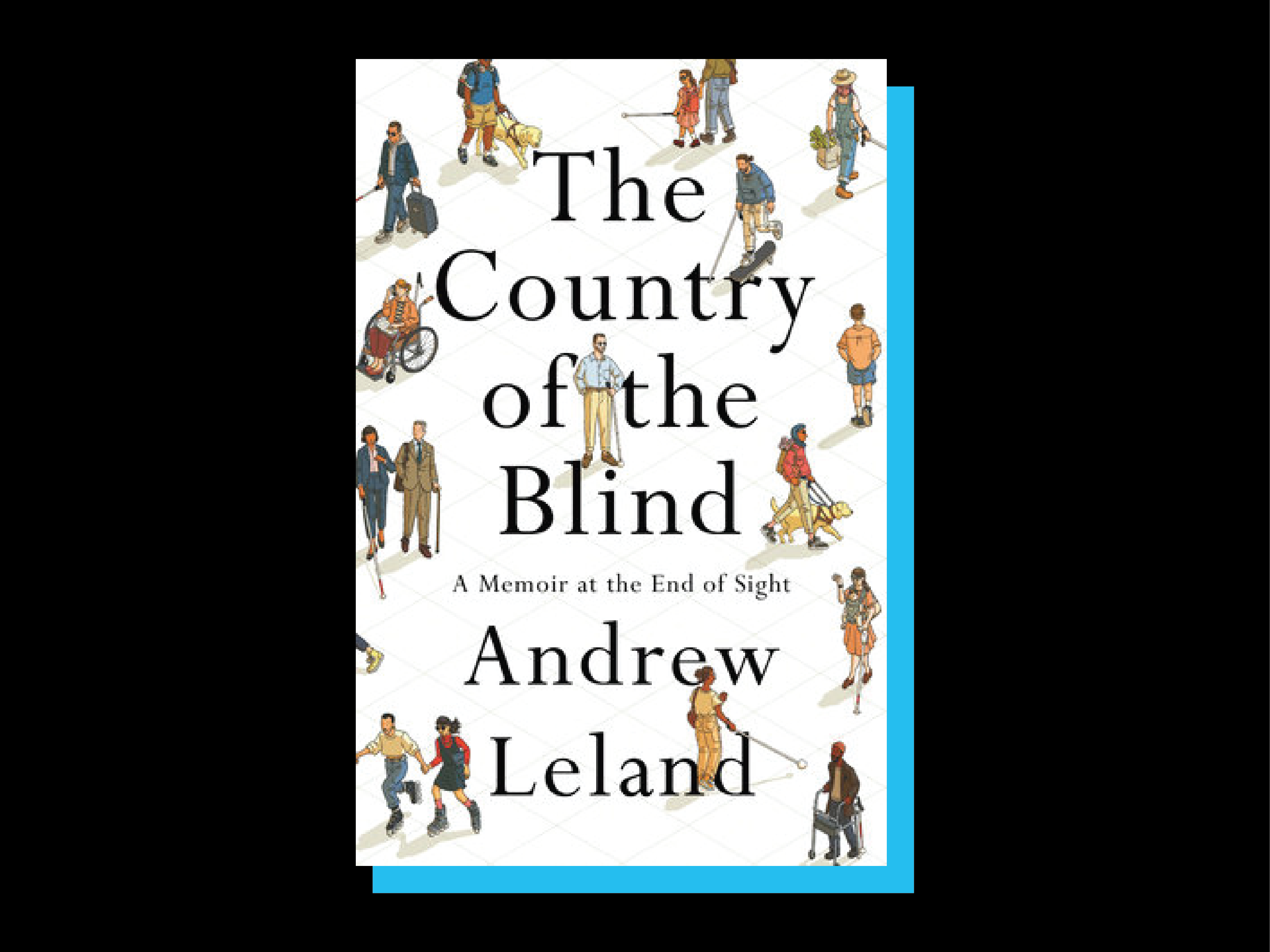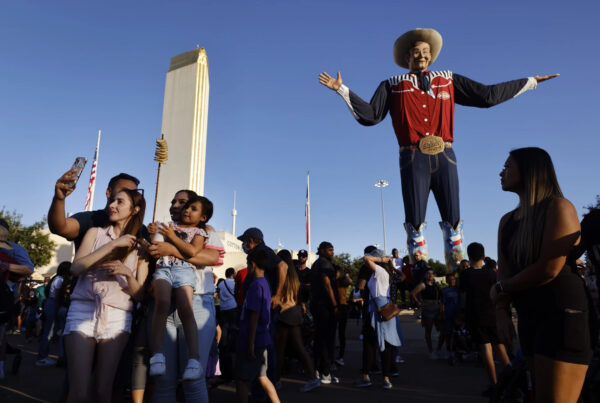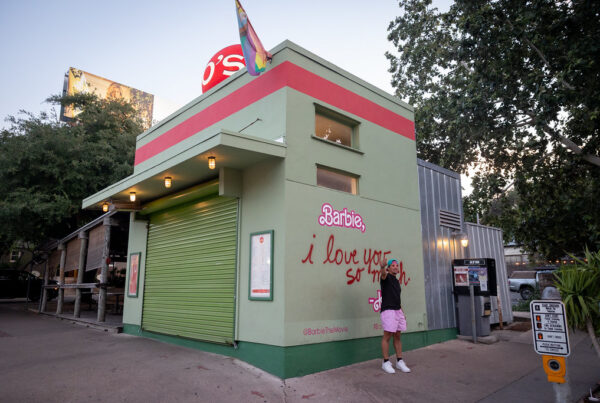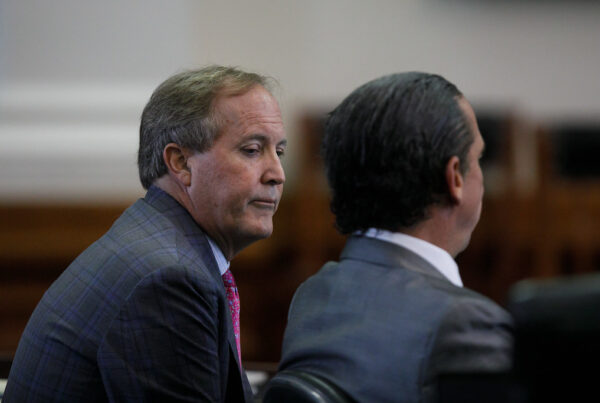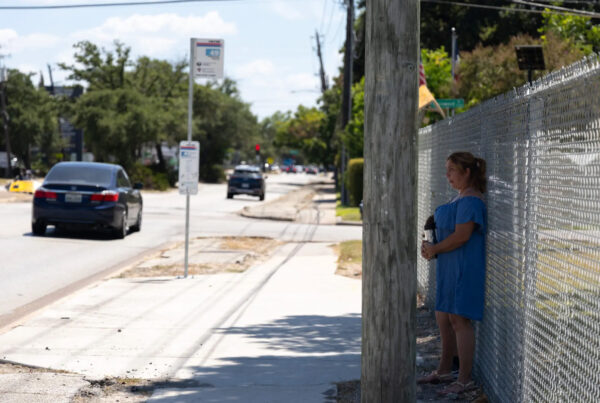Author Andrew Leland is losing his vision.
Turning that experience into a memoir gave him the opportunity to process his experiences, including the ways his blindness is perceived by others. But “The Country of the Blind” also contextualizes blindness within a larger world.
It’s a big task, but Leland says it was the most effective way to tell his story and avoid some of the tropes of disability memoir. Leland spoke to the Standard’s Shelly Brisbin on her podcast, Parallel. Listen to the interview above or read the transcript below.
This transcript has been edited lightly for clarity:
Shelly Brisbin: Your book is a memoir about coming to terms with your impending blindness and how you discovered it and all the sort of personal things that affect your life. But you also include a lot of history and even technology and ideas and philosophy in there. I guess I’m wondering how you decided on the scope of this book when you were thinking about, “Hey, I want to write a blindness memoir?”
Andrew Leland: Well, I had read a number of blindness memoirs, and I loved a lot of blindness memoirs. You know, there’s some bad ones out there, too. And by “bad,” I mean, I guess badly-written, but also just sort of like maudlin and sort of inspirational.
And, you know, I think there’s a place for that. But I think for me, really that’s not what I was looking for. And so in some ways I wrote the book that I wanted to read for myself, which didn’t skimp on the sort of emotional and personal parts of the experience of vision loss.
But that didn’t stay in that space, and that really, really was like a reflection of what I wanted, which was to understand emotionally, but also really understand in these other domains, like understand sort of practically and historically and sociologically and, you know, technologically. Like what is this world that I’m entering? What is the “country of the blind?”
And so as a result, you know, there are all these memoiristic parts where I’m talking about my family and I’m talking about my life. But then, in every case, I try to use those experiences as springboards into thinking about the questions around “where did screen readers come from?” You know, there is a history of Braille in there and, you know, histories of different blindness organizations and really just trying to understand the world that I’m entering as I’m entering it.
» TEXAS STANDARD SPECIAL: The State of Disability in Texas
I’ll say that the thing that’s interesting about your personal story is that you don’t feel like you have to, it seems to me, stick to a narrative that says, “okay, this is how I feel about blindness.” You’re ebbing and flowing. Sometimes, you’re in your feelings. Sometimes, you’re fairly analytical about it. And that’s kind of like vision loss itself, right? Especially if it’s continuing. You’re going to feel different ways on different days. What’s the expression you use? “I’m feeling particularly blind today.”
That felt important to me because I think, yeah, I mean, I like talking to blind people and going through my own experience of it. I think that’s a pretty common experience.
Like, I don’t think any blind people feel blind all day long, every day. Certainly, I’m a man all day, every day. But, like, it’s not like I’m constantly walking around being like, “as a man, I’m going to have a cup of water now,” right? Like “as a blind person, it’s time for me to send an email.” Like it’s really only when in usually social contexts, these things are set into relief.
Sometimes that has to do with the fact that we’re asked questions like we’re supposed to account for ourselves. “How do you do this?” Or “what’s your process?” Or “tell me about your white cane” or whatever it is. Did you feel that weighs heavy on you? The idea that you have to explain blindness to people, either in a social situation or like on a street corner, when you’re not sitting down at your computer writing in ways that you feel express it in the best way possible?
Yeah, I mean, I think it’s funny. Like there are certainly times when I’m out in the world, and I don’t want blindness to be a part of my identity necessarily. And I’m just like trying to get a cup of coffee, and I don’t want to talk about, you know, yeah, the cane or how much vision I have or how I do things in my life.
I think that for me, in the place I am in my life and certainly the place I was during the years I was writing this book, that feeling was overshadowed a bit by the feeling of wanting to explain to people what I was going through – in part to explain to myself, because it just felt so new and confusing and other people seem confused and I felt confused and I could see that more happening after I’ve kind of been through it. Like in five years when I’m like more blind and more comfortable with sort of like the basics of what I have to do as a blind person, then I think it’s talking to people who’ve been blind their whole lives who are just like, “Dude, I’m trying to walk to work.” Like, “do not give me directions. I don’t need any interactions with you right now.”
You know, I appreciate that. That’s not as much my experience day to day because for me, it was much more like, “I can see all these people looking at me funny with my cane.” I wish I could just hand them a book that says, like, you know, in 300 distinct pages, everything that I am feeling and thinking and all the cultural context of that.
So in a way, like obviously, I’m not walking around with a satchel of this book to hand out, but it was a sort of memo to the world of what this experience is like in part for myself, but also because I felt like the world needed that kind of explanation.
It feels like when you have some vision, whether you call it legally blind or whether it’s you’re a guy with a cane or dark glasses or however you present, you’ve got another layer of explanation. People know what blindness is, but they don’t know what “high partial” means, or “visually impaired” or whatever – “low vision.” Do you have a patter that you go through with people, or do you care to do that? Because there are a lot of times when I won’t do that.
When you won’t do what?
I won’t explain myself. “This is what caused my blindness. This is how long I’ve had it. This is what I can and can’t do.” Because you get that question a lot, right? “What can you/how much can you see?” And even if you gave a technical answer, whether it was your visual acuity or what your field was, what would that mean to the observer?
Right. Yeah. No, it very rarely means anything. And even if you do say it, then they’re like, “okay, but the other stairs, okay? You know, like they don’t have a sense of like what that actually means. And I’m like, “yes, the stairs are fine.” There’s nothing preventing me from holding a handrail and taking one step in front of the other. But every person is different.
So but yeah, to answer your question, the ambiguity of being low vision is constantly on my mind and was really, in some ways, the entry point to this book for me because I hit a point in my life where I was pretty convinced that I needed to start using my cane wherever I went in public, even while I could still see a whole lot. And just because I had hip-checked enough toddlers, you know, and like, kicked enough dogs and almost sprained my ankle on enough curbs and almost done cartwheels over fire hydrants and was just like, “okay, this is ridiculous. I’m going to injure someone else for myself. I got to do this.”
But then, of course, like suddenly the whole world is in my mind looking at me like I’m a fraud. And, you know, in some special cases, people actually did accuse me of faking it, which is, I think a sadly common experience for blind people, even people with no vision.
I was fascinated by that because I had a similar experience. I think a lot of low-vision people do, whether they acquire blindness or whether they acquire a cane, decide they need to use it. And your perspective and what you wrote about was feeling like you were presenting as a fraud to the outside world.
My perspective is I’m putting on a flashing neon sign that says, “look at me, I’m the blind person,” and that’s not who I want to be in the world. I want to be the person walking by that you don’t necessarily notice, right? Was that your experience too, or at all or no?
Oh, totally.
You’re totally stripped of anonymity. You can’t just be a pedestrian. You’re like a problem to be managed. You’re a spectacle, and it’s upsetting. I didn’t realize how much I took for granted that feeling of it’s really like a privilege of anonymity.
And I think other people with sort of stigmatized identities, whether you want to call it, you know, like a person of color walking through a white neighborhood, you know, is a very different set of considerations than a blind person. But I think there’s like a similar dynamic there where, like, you are outside the mainstream, you’re not normal, and you get treated differently. And there’s a real pain in that.


